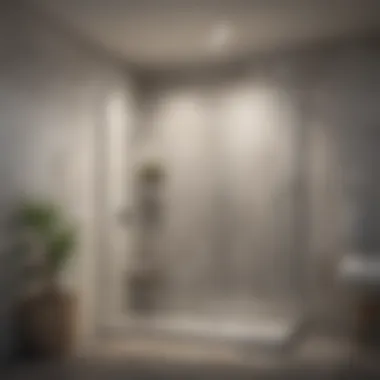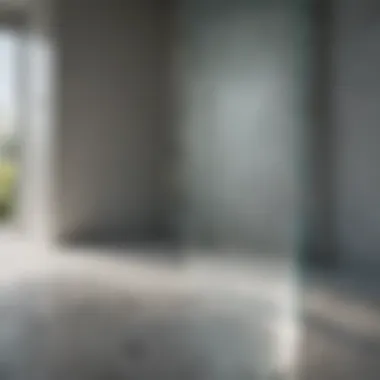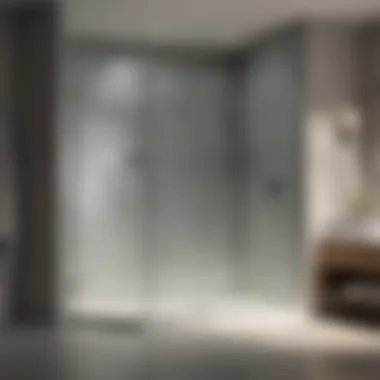Choosing the Best Glass for Your Shower Doors


Intro
When it comes to renovating a bathroom, choosing the right glass for shower doors is vital. The type of glass can impact both functionality and aesthetics. Different glass options have unique benefits and challenges. Understanding these elements helps homeowners make better decisions. This article will explore various types of shower door glass, analyzing facets like safety, maintenance, and how they fit into current design trends.
Design Trends
Current Popular Styles
In today's bathroom designs, minimalism is a significant trend. Clear glass shower doors are leading the way. They create a sense of openness, making smaller spaces feel larger. Framed and frameless options are also gaining traction. Frameless doors offer a sleek, clean look, while framed options may provide added durability.
Another rising popularity is textured glass. It offers some privacy while still allowing light to filter through. Styles like frosted or patterned glass can match various aesthetics from modern to traditional, adding a unique touch to any bathroom.
Color Palettes for Modern Spaces
Color in bathroom design is shifting towards neutral and earthy tones. Soft greys, whites, and beiges are preferred. They create a calming atmosphere. The glass used in shower doors can complement these palettes. Clear glass will enhance brightness in light-colored spaces. Darker or tinted glass might suit a rich color scheme better, providing contrast and depth.
"The choice of glass for shower doors plays a crucial role in how a bathroom feels and functions."
Safety Considerations
Safety is paramount when choosing shower door glass. Tempered glass is a common choice. This type is heat-treated, making it more resistant to impacts. In the unfortunate event of breakage, tempered glass shatters into small pieces, reducing the risk of injury. It is essential to ensure that the glass meets safety standards set by law.
Maintenance and Care
Maintaining shower door glass requires attention. Clear glass may highlight soap scum and water spots, necessitating regular cleaning. Homeowners may consider glass coatings to reduce maintenance. These treatments make the surface smoother, preventing build-up. Textured or frosted glass can hide water spots better and require less frequent cleaning.
Culmination
Foreword to Shower Door Glass
Selecting the right glass for shower doors is a crucial decision for homeowners and interior design enthusiasts alike. The glass not only serves a functional purpose but also contributes significantly to the overall aesthetic of a bathroom. So, understanding shower door glass is essential for those aiming to enhance their living space while ensuring safety and durability.
Glass acts as a barrier, separating wet zones from dry areas, which is a primary reason it is commonly used in shower enclosures. The material must be durable enough to withstand daily use and potential impacts, yet also allow for light transmittance to keep the space feeling open and airy.
The choice of glass can affect maintenance routines as well. Certain types of glass are more resistant to staining and require less frequent cleaning. This aspect is important for busy households or for those who prefer low-maintenance solutions.
In addition, aesthetic appeal cannot be disregarded. Clear glass, patterned options, or frosted treatments can completely change the view and feel of a bathroom. Creating a harmonious design involves selecting a glass that aligns with the existing decor and personal taste.
With various options available, the right glass can enhance safety features and comply with local building codes. In the subsequent sections, we will explore different types of glass, their benefits, and considerations for maintenance. By the end, readers will gain insights to make an informed choice when selecting glass for their shower doors.
Importance of Choosing the Right Glass
Choosing the right glass for shower doors is fundamental for both practical and aesthetic reasons. The glass you select influences not only the overall look of your bathroom but also impacts usability, safety, and maintenance. Many homeowners often overlook the significance of this decision, yet it can lead to lasting effects over time.
Safety is a primary concern. Glass needs to withstand daily impacts, hot steam, and humidity. Tempered glass, for instance, is a popular choice due to its strength and ability to shatter into small, less harmful pieces. Knowing which type of glass offers the most protection is essential when making your selection.
Another key element is maintenance. Some glass options require more upkeep than others. For example, clear glass can show water spots and soap scum quite easily, while frosted or patterned glass might hide some of these blemishes better. Homeowners should consider how much time they are willing to spend on cleaning and upkeep before finalizing their choice.
Aesthetic appeal is not to be underestimated. The right glass can enhance the design of your bathroom, creating a seamless or striking visual experience. Minimalist trends often favor frameless designs, showcasing clean lines and transparency. On the other hand, framed glass can add a sense of traditional elegance. Your choice in glass contributes greatly to the overall ambiance of the space.
"The glass you choose is not just about aesthetics; it has vital implications for safety and maintenance as well."
Moreover, understanding how the glass interacts with factors like light can affect the room's brightness. Clear glass allows for maximum light transmission, while frosted and tinted options can create a softer lighting effect.
When you think about the financial aspect, the cost of the glass is also significant. Generally, higher quality glass comes with a heftier price tag. However, investing in quality glass can lead to saving on repairs or replacements in the long run.


In summary, the importance of choosing the right glass for shower doors encapsulates safety, maintenance, aesthetic value, and overall cost. Each of these elements should be carefully weighed to ensure a well-informed decision that ultimately enhances both the functionality and beauty of your bathroom.
Types of Glass for Shower Doors
Choosing the right type of glass for shower doors plays a critical role in ensuring both functionality and aesthetics. The glass options available differ in manufacturing methods, durability, and appearance. Understanding these differences can help homeowners select the ideal glass that meets their unique requirements. The right choice not only enhances the bathroom's visual appeal but also contributes to safety and maintenance ease. Below we explore three main types of glass commonly used in shower doors: tempered glass, laminated glass, and the choice between frameless and framed glass configurations.
Tempered Glass
Tempered glass, also known as toughened glass, is widely favored for shower doors due to its high strength and safety features. It is made by heating glass to a high temperature and then rapidly cooling it. This process increases its strength compared to regular glass, making it about five times stronger. If tempered glass breaks, it shatters into small, blunt pieces which reduces the risk of injury.
Key benefits of tempered glass include:
- Safety: Its ability to break safely is paramount in a bathroom setting where the risk of breakage is higher due to moisture and foot traffic.
- Heat Resistance: This glass can withstand high temperatures, which is particularly useful in a steam-filled shower.
- Visual Clarity: Tempered glass offers excellent transparency, allowing natural light to illuminate the space while maintaining an open feel in smaller bathrooms.
However, the higher cost and the need for professional installation might deter some homeowners. In addition, once tempered glass is manufactured, it cannot be cut or adjusted, which may limit custom design options.
Laminated Glass
Laminated glass is constructed from two or more layers of glass bonded together with an interlayer of polymer resin. This combination not only provides additional strength but also enhances safety. Unlike tempered glass, if laminated glass shatters, the pieces adhere to the interlayer, preventing them from falling and scattering. This feature is particularly important in households with small children or pets.
Main advantages of laminated glass include:
- Enhanced Sound Insulation: The interlayer provides sound-dampening qualities, making it an excellent choice for privacy in shared bathrooms.
- UV Protection: Laminated glass can block harmful ultraviolet rays, reducing the fading of bathroom fixtures and paint.
- Design Flexibility: Laminated glass allows for decorative interlayers or patterns to be included, offering more aesthetic variety for homeowners.
Despite these benefits, laminated glass often carries a higher price point than tempered glass, which might lead homeowners to consider budget constraints when making their decision.
Frameless vs. Framed Glass
When selecting shower doors, homeowners must also choose between frameless and framed glass options. Both styles offer distinct advantages and can suit various bathroom designs and layouts.
Frameless glass doors provide a clean and modern look. These doors use an advanced installation system that allows them to be mounted without metal framing around the edges. This design allows for maximum openness and light, creating a sense of space. They are easy to clean and maintain because there are fewer crevices for water and soap scum to accumulate.
However, frameless doors require strict precision during installation. Any misalignment can lead to leaks and functionality issues.
On the other hand, framed glass doors are typically easier to install and offer extra support, making them appealing for some less experienced DIYers. The metal frame can reduce the risk of breakage and may be available in different finishes, enhancing the overall look of the bathroom.
Choosing between framed and frameless glass often comes down to personal preference, budget, and design aspirations.
Key Takeaway: Investing time in understanding the types of glass available for shower doors is essential. Considerations like safety, aesthetics, and maintenance needs play a significant role in making an informed decision.
Functional Properties of Shower Door Glass
When selecting glass for shower doors, understanding its functional properties is essential. These aspects not only influence the usability of the shower but also contribute to the overall experience. Functional properties encompass transparency, insulation, safety, and durability of the glass, and each factor plays a significant role in the performance and aesthetics of the installation.
Transparency and Light Transmission
The clarity of shower door glass affects the perception of space in a bathroom. Transparent glass allows for maximum light flow, making the area feel more open and spacious. Homeowners often prefer clear glass for its ability to create a seamless transition between the shower and the rest of the bathroom. This choice enhances visibility and can also be beneficial for cleaning, as it minimizes areas where soap scum can accumulate.
Moreover, light transmission is linked to mood and ambiance. Natural light, filtered through glass, creates a more inviting atmosphere. Therefore, it is crucial to consider how the glass choice will blend with other design elements, like paints and fixtures.
"A well-chosen glass can transform a confined space into an oasis of light and style."
Insulation and Energy Efficiency
Insulation is not typically a primary focus in shower door selection, yet it holds significant importance. Glass with poor insulation can lead to heat loss, making a shower less comfortable. Conversely, energy-efficient glass minimizes heat exchange, which can enhance the overall experience while reducing energy costs. Although most glass used in shower doors may not offer the same level of insulation as double-glazed windows, some types, like laminated glass, can provide better thermal properties.


Selecting glass that complements the energy efficiency of the home reflects a thoughtful approach to sustainability. It can reduce the workload on heating systems, contributing to lower utility bills. In this regard, an investment in quality glass options can pay dividends in both comfort and cost savings.
Safety and Durability
Safety is paramount when choosing glass for shower doors, given the high potential for breakage in wet conditions. Tempered glass is the preferred option in this regard. It is treated to withstand higher levels of impact compared to standard glass. When broken, tempered glass shatters into small, blunt pieces, greatly reducing the risk of serious injuries.
Durability extends beyond safety; it includes resistance to everyday wear and tear. Shower environments can be harsh, with humidity, heat, and potential scratches from cleaning tools. Investing in robust and high-quality glass ensures longevity and performance. A careful selection based on safety standards and durability criteria not only protects users but also safeguards the investment in home design.
Aesthetic Considerations
Choosing shower door glass is not only about function but also about aesthetics. A well-chosen glass type complements the rest of the bathroom design. It contributes to the overall ambiance, adding a sense of style and elegance. The color, texture, and clarity of the glass can significantly enhance or detract from the space. Homeowners often prioritize how their shower doors fit into their broader design scheme. Different options provide varied levels of visual appeal. Knowing the aesthetic possibilities helps in making an informed choice, leading to a harmonious design.
Clear vs. Patterned Glass
Clear glass remains a popular choice due to its simplicity and versatility. It creates an illusion of more space and allows natural light to flow freely. However, it may not provide privacy, an essential factor for many homeowners.
On the other hand, patterned glass offers a unique decorative element. It allows for creative expression while providing a degree of privacy. The patterns can range from subtle textures to bold designs, giving a more personalized touch to the shower space. When deciding, it's essential to weigh the importance of light versus privacy, making choices that align with personal preferences.
Frosted Glass Options
Frosted glass has gained traction for its ability to balance light and privacy. This type of glass allows diffused light to enter, brightening the space without the complete transparency of clear glass. Frosted options can be achieved through various methods, such as acid etching or sandblasting.
Homeowners appreciate the soft look of frosted glass, especially in modern designs. It's also relatively easy to maintain, as the frosted surface can help minimize the visibility of water spots. Frosted glass works well in both traditional and contemporary settings, making it a versatile choice for various decor styles.
Custom Treatments and Finishes
For those seeking a more personalized touch, custom treatments and finishes are worth considering. Treatments can include decorative films, specialized coatings, or even unique etching designs. These not only enhance visual appeal but can also provide additional functionality, such as increased privacy or reduced glare.
Custom finishes can reflect the homeowner's personality and style, ensuring that the shower becomes a significant design element in the bathroom. When selecting custom options, it's vital to consider how they will hold up over time and if they align with maintenance routines. This approach guarantees that the chosen aesthetic contributes positively to the overall bathroom experience.
Maintenance of Shower Door Glass
Maintaining shower door glass is crucial not only for aesthetic appeal but also for functional longevity. Regular upkeep ensures clarity, prevents damage, and contributes to overall bathroom hygiene. Neglecting maintenance can lead to water stains and mildew, which diminish the overall experience of your shower space. It is also beneficial for increasing the lifespan of the glass, which can save homeowners significant costs in the long run.
Cleaning Techniques
Cleaning is the first step in maintaining shower door glass. It is essential to use the right products that do not harm the glass finish.
- Daily Wipe Down: A simple daily wipe with a squeegee or microfiber cloth can remove soap scum and water droplets, preventing buildup.
- Cleaning Solutions: Use a mild dish soap and warm water solution or a vinegar-water mixture. Avoid harsh chemicals, as they may etch or dull the glass.
- Scrubbing: For tough spots, non-abrasive sponges or soft-bristle brushes can be effective. Ensure to scrub gently to avoid scratches.
- Rinsing: After applying any cleaner, thoroughly rinse the glass with clear water to remove residues.
These techniques not only keep the glass looking fresh but also aid in ensuring hygiene by minimizing the growth of bacteria.
Preventing Water Stains and Mildew
Water stains and mildew can be problematic on shower doors, affecting both appearance and hygiene. Several strategies can help in prevention:
- Sealants: Applying a glass sealant can prevent minerals from water attaching to the surface, thereby reducing mineral buildup and stains. Sealants create a protective layer over the glass.
- Proper Ventilation: Keeping the bathroom well-ventilated reduces humidity and prevents mold growth. Consider installing an exhaust fan if needed.
- Temperature Control: Use cooler water for showers when possible; this can reduce the amount of steam and water that accumulates on surfaces.
- Regular Inspection: Routinely check for any signs of mildew or stains, addressing them immediately to prevent them from becoming larger issues.
By focusing on effective cleaning and prevention techniques, homeowners can enhance the longevity of their shower door glass while ensuring a clean and inviting bathroom environment.
"Regular maintenance not only improves the aesthetic appeal but significantly extends the lifespan of shower door glass."
Looking after your shower door glass is an investment in your home’s value and comfort.
Cost Implications


In the decision-making process for shower door glass, understanding the cost implications is crucial. Cost not only impacts budget but also influences the quality and durability of the materials chosen. Various factors play into the overall expense, necessitating a thorough examination of both material costs and installation expenses.
Material Costs
When considering the material costs of shower door glass, it is essential to evaluate the different types available. Tempered glass, known for its strength and safety, generally comes at a premium. Laminated glass, while offering additional safety features, can also escalate costs.
Factors affecting material costs include:
- Thickness: Thicker glass tends to be more expensive.
- Type: Different glass types, like frosted or patterned glass, may incur extra charges.
- Brand and Quality: Higher quality glass from reputable manufacturers contributes to increased prices.
The potential for customization also raises costs. For example, custom-sized or uniquely designed shower doors will not only demand higher material costs but also adjustment in manufacturing processes. Always compare options to find a balance between quality and affordability.
Installation Expenses
Installation expenses represent another significant part of the overall cost for shower doors. These expenses can vary widely depending on several factors such as complexity of the installation, configuration of the bathroom, and local labor rates.
Key considerations regarding installation expenses include:
- Professional Installation vs. DIY: Hiring a professional might be more costly, but can save you from mishaps.
- Type of Installation: Frameless doors often require more careful handling and precise installation, which can increase labor costs.
- Repairs and Modifications: Existing structures may necessitate repairs or modifications, adding to overall costs.
In short, understanding both material costs and installation expenses is essential for making an informed decision. Adequate planning ensures you choose a glass that fits not only your design needs but also your budget.
Regulatory Considerations
Understanding regulatory considerations is vital when it comes to choosing glass for shower doors. These considerations protect not only the integrity of the home but also the safety and wellbeing of those who use the space. Compliance with building codes and standards ensures that your shower door will withstand wear and potential hazards. Failing to adhere to these regulations may lead to liability issues and unsafe conditions, so it is essential to pay attention to details.
Building Codes and Standards
Building codes and standards encompass a range of regulations that govern the installation of shower doors. They dictate the type of glass that is permissible in residential settings, focusing on its thickness, type, and ability to resist impact. For instance, tempered glass is often a requirement, as it is less likely to shatter upon impact.
Some key points to consider regarding building codes include:
- Local Jurisdictions: Always check local codes, as regulations can vary widely between areas. Each city or county may have its specific requirements that are tailored to the architectural styles or safety needs of the region.
- Installation Practices: Certain standards dictate the installation techniques to ensure the fixtures are secure and capable of handling regular use. Adhering to these methods helps avoid future complications.
- Inspectors and Permits: Obtaining the necessary permits and having installations inspected by a professional can save homeowners from unnecessary hassle down the line.
Safety Certifications
Safety certifications are endorsements that verify a product has met industry standards for performance and durability. These certifications can influence your decision on shower doors, as they provide assurance that the chosen glass has been rigorously tested. Common safety certifications include those from groups like the American National Standards Institute (ANSI) and the Tempered Glass Association.
Benefits of opting for certified glass:
- Peace of Mind: Knowing that the glass has passed safety tests can give confidence to homeowners about their investment.
- Insurance Benefits: Some insurance companies may offer reduced premiums for homes that utilize certified materials, reflecting the importance of safety.
- Value Enhancement: Homes that conform to safety standards often see a boost in property value, as buyers tend to prefer properties that adhere to modern safety regulations.
"Choosing the right glass also means ensuring compliance with regulatory frameworks, which safeguard occupants and enhance property value in the long run."
By diligently considering regulatory aspects like building codes and safety certifications, homeowners can make informed decisions. This diligence extends beyond aesthetics, truly prioritizing safety and functionality in their choice of shower doors.
End: Making an Informed Decision
In the process of selecting the ideal glass for shower doors, informed decision-making is paramount. The choices made can significantly impact both the functionality and aesthetic of a bathroom space. It goes beyond mere appearance; it encapsulates safety, ease of maintenance, and adherence to regulatory requirements. Hence, understanding each element becomes crucial.
One fundamental consideration is safety. Options such as tempered and laminated glass offer varying degrees of strength and resilience. When choosing a glass type, it is essential to evaluate which one aligns with personal safety preferences and the specific demands of the home environment.
Additionally, aesthetic preferences should not be overlooked. The design of the glass can influence the overall ambience of the bathroom. Whether opting for clear, frosted, or patterned glass, each choice sends a different message. Homeowners should reflect on their style and how it complements existing decor.
Moreover, anticipating future maintenance requirements is wise. Some types of glass may require more frequent cleaning or special treatments to remain in optimal condition. Analyzing factors such as water hardness and the general climate can inform this aspect, as they influence the longevity and appearance of the glass.
A strategically sound approach also includes assessing cost implications. From initial material purchase to installation expenses, a thorough understanding of financial commitments can prevent unexpected financial burdens post-purchase. Reading about diverse costs associated with specific glass options can enhance comprehension of what is financially feasible.
Lastly, keeping abreast of regulatory considerations is vital. Ensuring that the chosen glass type meets local building codes and safety standards safeguards both the homeowner and the integrity of the property. Not only does this grant peace of mind, but it also potentially avoids legal complications in the future.
In summary, when faced with the task of selecting shower door glass, clarity and comprehensive analysis pave the way. By considering safety, aesthetic appeal, maintenance needs, costs, and regulations, homeowners can confidently choose a glass that fulfills their desires and needs. This informed approach lays the foundation for a satisfying investment that enhances their living space.















